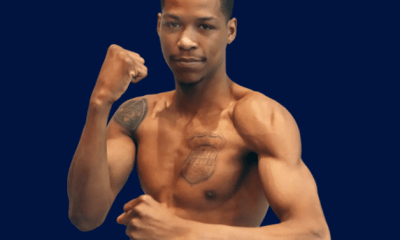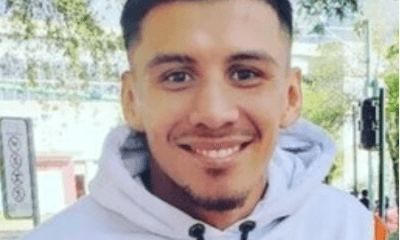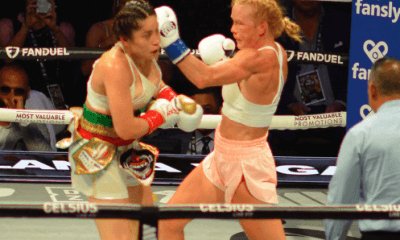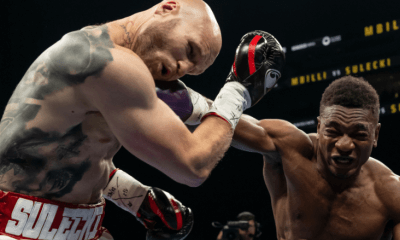Featured Articles
Wilder, Fury Both Believe Providence is on Their Side
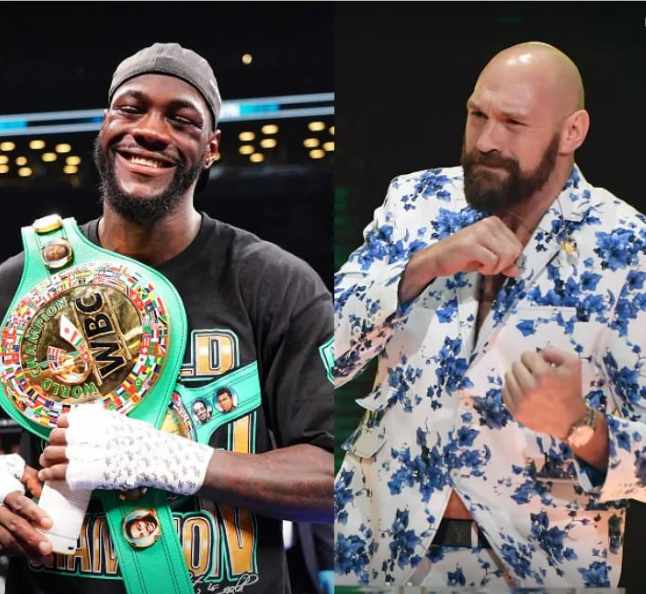
Wilder, Fury Both Believe Providence is on Their Side
You hear it more and more frequently at the conclusion of significant sporting events, including boxing matches. The winner or key-play maker for the victors thanks God for His supposed intervention, thus giving the impression that the Almighty, like many humans who pray that their wagers pay off, plays favorites on the field or in the ring, perhaps even to the point of running a celestial bookie operation.
Remember how it was when Joe Louis knocked out Adolf Hitler’s favorite heavyweight, Max Schmeling, in the first round of their June 22, 1938, rematch at Yankee Stadium? Millions of Americans considered it an affirmation of Divine Intervention, of Star-Spangled good conquering the pure evil of all that the Nazis represented, and never mind that Schmeling found Der Fuhrer as repugnant as did Louis and his vast legion of admirers.
Nowadays, choosing whom to support in a major fight, emotionally and financially, is not always so cut-and-dried. Some will plunk their money down on someone representing their country or home region, more pragmatic types are apt to follow their heads instead of their hearts. But the bedrock principle of gambling still most often applies: when in doubt, root for whichever individual or team will yield a profit rather than a loss.
Given that Saturday night’s megafight between WBC heavyweight champion Deontay Wilder (42-0-1, 41 KOs) and lineal titlist Tyson Fury (29-0-1, 20 KOs) is about as close as it ever gets to being a 50/50 proposition (Wilder is favored by the narrowest of margins), many of those backing their play with big bucks might have to confess that they’re doing so with fingers crossed and fervent prayers offered to a deity that may or may not have determined the outcome beforehand.
But there are two individuals who profess to be absolutely certain of a favorable outcome at Las Vegas’ MGM Grand, and not just for reasons that are presumably based in fact or logic. Wilder, the pulverizing puncher from Tuscaloosa, Ala., has offered his opinion that God indeed has blessed his cause, much as it was widely believed nearly 82 years ago that the king of heaven wanted Louis (also a native Alabaman, for those who take note of such things) to whack out Schmeling. But a different certainty is being offered by Fury, the gigantic “Gypsy King” from the United Kingdom who also claims he has it on good authority that it is his destiny to emerge triumphant.
Wilder, who had an audience with Pope Francis in the Vatican in December, at which time he was named the papal Ambassador for Sport, said he has been aware since childhood of the plan God supposedly has for him.
“I’ve always had power,” he said. “I always tell the story of how my grandmother said I was anointed by God, that God is trying to use me for things. It’s just all about living, coming into this world and finding your purpose in life. I think I found one of my purposes in life, and of course that’s whupping ass and taking names. And I do that very well.
“I’ve just been blessed tremendously. It’s one of the things I can’t describe how it transpired. When you have a calling in life, it’s just that. I just have a calling all my life. I’m showing the world who I am and what I am.”
Fury doesn’t exactly identify God as the reason he will win. His explanation vaguely hints at Tarot cards and tea leaves, but he’s just as convinced that a mighty wave of predetermination will carry him to his inevitable success on fight night. He claims that it is his seemingly miraculous recovery from an emphatic 12th-round knockdown by Wilder in their first meeting, on Dec. 1, 2018, in Los Angeles, that has cloaked him in virtual invincibility.
“I didn’t know I was knocked down,” he said of the second of the two times he was dropped by Wilder. “It wasn’t a flash knockdown, like in round nine. It was like a knockout. I watched it on tape. He hit me with a right hand and when I was on my way down he hit me with a left hook. It should have been bye-bye. I remember opening my eyes after around four seconds. I thought, `Get up!’ I just jumped up. And then Wilder rushes in and hits me with another massive left hook right on the temple. But it was like I was bullet-proof. It was a more damaging shot than the one that buried me. But it wasn’t meant to be. It wasn’t Wilder’s time (to win). It wasn’t my time to lose.
“I come from a long line of gypsies going back thousands of years. I’m the latest king of our tribe, our people, whatever you want to call them. I believe it’s written in the stars. I don’t believe all the hard work, all the dedication, have that much to do with it. You have to do that as well, but some things that have happened to me in my life now make me 100% believe it’s written in the stars.”
(One has to wonder how Fury’s public pronouncement that frequent cunnilingus has helped strengthen his jaw was received by his wife and mother of the couple’s five children, the most outrageous such comment since Livingstone Bramble bragged that, counter to standard boxing protocol, he engaged in sexual activity with his wife multiple times a night right up to the day of his bouts.)
For fight fans hesitant to buy into the notion, proffered by either principal, that a higher power has a vested interest in what takes place inside the ropes in this much-anticipated do-over, standard factors are likely to ultimately prove the difference. Can Wilder’s superior power get him home should he find the mark with that devastating right hand? Will Fury’s more polished boxing skills flummox his bigger-hitting foe all the way to the final bell and a nod on points? Or will Fury keep his word that he will take the fight straight to Wilder in the center of the ring, a radical shift in strategy possibly orchestrated by his new trainer, Javan “Sugar” Hill?
Check out more boxing news on video at The Boxing Channel
To comment on this story in The Fight Forum CLICK HERE
-

 Featured Articles3 weeks ago
Featured Articles3 weeks agoAvila Perspective, Chap. 330: Matchroom in New York plus the Latest on Canelo-Crawford
-

 Featured Articles1 week ago
Featured Articles1 week agoVito Mielnicki Jr Whitewashes Kamil Gardzielik Before the Home Folks in Newark
-

 Featured Articles4 weeks ago
Featured Articles4 weeks agoAvila Perspective, Chap 329: Pacquiao is Back, Fabio in England and More
-

 Featured Articles3 weeks ago
Featured Articles3 weeks agoOpetaia and Nakatani Crush Overmatched Foes, Capping Off a Wild Boxing Weekend
-

 Featured Articles2 weeks ago
Featured Articles2 weeks agoCatching Up with Clay Moyle Who Talks About His Massive Collection of Boxing Books
-

 Featured Articles3 weeks ago
Featured Articles3 weeks agoFabio Wardley Comes from Behind to KO Justis Huni
-

 Featured Articles4 weeks ago
Featured Articles4 weeks agoDelving into ‘Hoopla’ with Notes on Books by George Plimpton and Joyce Carol Oates
-

 Featured Articles1 week ago
Featured Articles1 week agoMore Medals for Hawaii’s Patricio Family at the USA Boxing Summer Festival

